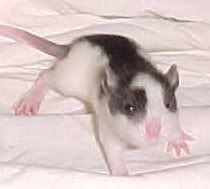
whenever cancer comes up in a conversation with my friends, they always say - whatever, they'll have that shit cured by the time i'm old. well, i never thought that was something good to bank on. it's better to just quit smoking or whatever if you want to live longer, right? well, the more i blog, the more i become a technological optimist. maybe science will have everything cured after a while, especially with genetics and all that.
look at this cute mouse. it's ridiculously cute, right? well, it has nothing to do with this article. it's just a cute mouse, and i like to put cute pictures of animals in my entries. but some mice perhaps very much like this one have a new 20% longer life span thanks to the wonders of science.
scientists at the university of washington have found a new way to eliminate free radicals. now, free radicals aren't just political prisoners that have escaped from jail, apparently they're also things that make us die faster, and they live in our bodies. catalase is a chemical in our cells that fights off these evil radicals, but usually it just swims around in our weak weak cytoplasm where it doesn't do all the radical fighting that it could. it's much better when catalase is amped up within the mitochondria, "the powerhouses of the cells." these transgenetic half-immortal super mice lived 20% longer because of this small adjustment, increasing catalase in their mitochondria.
“but it is important to remember that, just as mice are more complicated than flies or nematodes, humans are more complicated than mice."
too true. so, maybe we won't be half-immortal like these cute mice, but these scientists are holding out hope. after all, mice have cells, humans have cells, we all have mitochondria and we all die (if mice ever stole all of our research on them, they'd be all set. seriously). lead scientist on the project (why do scientists always have to pick leaders?) peter rabinovitch, coolly says that while he doesn't expect humans to be genetically altered like the mice, we could make pills able to increase the catalase inside of our mitochondria, having a similar effect as that had on the transgenic mice.
full article at new scientist


No comments:
Post a Comment